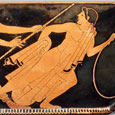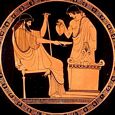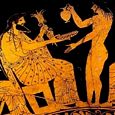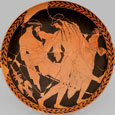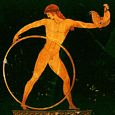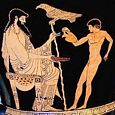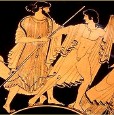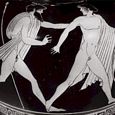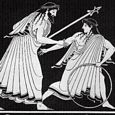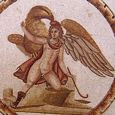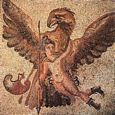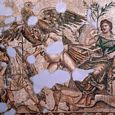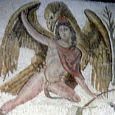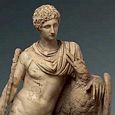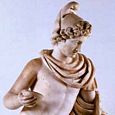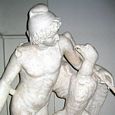GANYMEDES
Greek Name
Γανυμηδης
Transliteration
Ganymêdês
Roman Name
Ganymede, Catamitus
Translation
Gladdening Prince
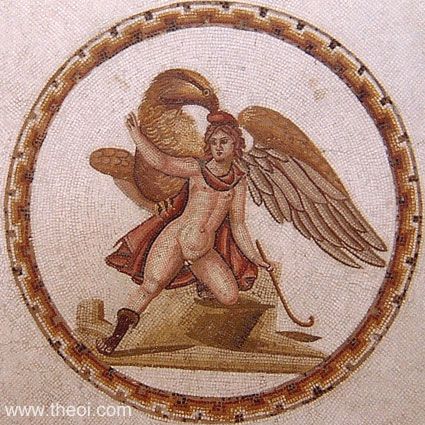
GANYMEDES (Ganymede) was a handsome Trojan prince who was carried off to heaven by Zeus in the shape of an eagle where he was appointed as cup-bearer of the gods. Ganymedes was also placed amongst the stars as the constellation Aquarius, his ambrosial mixing cup as Crater, and the eagle as Aquila. Ganymedes was often portrayed as the god of homosexual love and as such appears as a playmate of the love-gods Eros (Love) and Hymenaios (Hymenaeus) (Marital Love).
Ganymedes was depicted in Greek vase painting as a handsome youth. In scenes of his abduction he holds a rooster (a lover's gift), hoop (a boy's toy), or lyre. When portrayed as the cup-bearer of the gods he pours nectar from a jug. In sculpture and mosaic art Ganymedes usually appears with shepherd's crock and a Phrygian cap.
The boy's name was derived from the Greek words ganumai "gladdening" and mêdon or medeôn, "prince" or "genitals." The name may have been formed to contain a deliberate double-meaning.
FAMILY OF GANYMEDE
PARENTS
[1.1] TROS (Homer Iliad 20.232, Hesiod Catalogues of Women Frag 102, Homeric Hymn
5.203, Diodorus Siculus 4.75.3, Suidas)
[1.2] TROS & KALLIRHOE (Apollodorus
3.141)
[2.1] LAOMEDON (The Little Iliad Frag 7)
ENCYCLOPEDIA
GANYME′DES (Ganumêdês). According to Homer and others, he was a son of Tros by Calirrhoë, and a brother of Ilus and Assaracus; being the most beautiful of all mortals, he was carried off by the gods that he might fill the cup of Zeus, and live among the eternal gods. (Hom. Il. xx. 231, &c.; Pind. Ol. 1. 44, xi. in fin.; Apollod. iii. 12. § 2.) The traditions about Ganymedes, however, differ greatly in their detail, for some call him a son of Laomedon (Cic. Tusc. i. 22; Eurip. Troad. 822), others a son of Ilus (Tzetz. ad Lycph. 34), and others, again, of Erichthonius or Assaracus. (Hygin. Fab. 224, 271.) The manner in which he was carried away from the earth is likewise differently described; for while Homer mentions the gods in general, later writers state that Zeus himself carried him off, either in his natural shape, or in the form of an eagle, or that he sent his eagle to fetch Ganymedes into heaven. (Apollod. l. c. ; Virg. Aen. v. 253; Ov. Met. x. 255; Lucian, Dial. Deor. 4.) Other statements of later date seem to be no more than arbitrary interpretations foisted upon the genuine legend. Thus we are told that he was not carried off by any god, but either by Tantalus or Minos, that he was killed during the chase, and buried on the Mysian Olympus. (Steph. Byz. s. v. Arpalia; Strab. xiii. p. 587 ; Eustath. ad Hom. pp. 986, 1205.) One tradition, which has a somewhat more genuine appearance, stated that he was carried off by Eos. (Schol. ad Apollon. Rhod. iii. 115.) There is, further, no agreement as to the place where the event occurred. (Strab., Steph. Byz. ll. cc., Horat. Carm. iii. 20, in fin.) The early legend simply states that Ganymedes was carried off that he might be the cupbearer of Zeus, in which office he was conceived to have succeeded Hebe (comp. Diod. iv. 75; Virg. Aen. i. 28) : but later writers describe him as the beloved and favourite of Zeus, without allusion to his office. (Eurip. Orest. 1392; Plat. Phaedr. p. 255; Xenoph. Symp. viii. 30; Cic. Tusc. iv. 33.) Zeus compensated the father for his loss with the present of a pair of divine horses (Hom. Il. v. 266, Hymn. in Ven. 202, &c.; Apollod. ii. 5. § 9 ; Paus. v. 24. § 1 ), and Hermes, who took the horses to Tros, at the same time comforted him by informing him that by the will of Zeus, Ganymedes had become immortal and exempt from old age. Other writers state that the compensation which Zeus gave to Tros consisted of a golden vine. (Schol. ad Eurip. Orest. 1399; Eustath. ad Hom. p. 1697.) The idea of Ganymedes being the cupbearer of Zeus (urniger) subsequently gave rise to his identification with the divinity who was believed to preside over the sources of the Nile (Philostr. Vit. Apoll. vi. 26; Pind. Fragm. 110. ed. Böckh.), and of his being placed by astronomers among the stars under the name of Aquarius. (Eratosth. Catast. 26; Virg. Georg. iii. 304; Hygin. Fab. 224; Poet. Astr. ii. 29.) Ganymedes was frequently represented in works of art as a beautiful youth with the Phrygian cap. He appears either as the companion of Zeus (Paus. v. 24. § 1), or in the act of being carried off by an eagle, or of giving food to an eagle from a patera. The Romans called Ganymnedes by a corrupt form of his name Catamitus. (Plaut. Men. i. 2. 34.) Ganymedes was an appellation sometimes given to handsome slaves who officiated as cupbearers. (Petron. 91; Martial, Epigr. ix. 37; Juv. v. 59.)
Source: Dictionary of Greek and Roman Biography and Mythology.
CLASSICAL LITERATURE QUOTES
ZEUS' ABDUCTION OF GANYMEDE
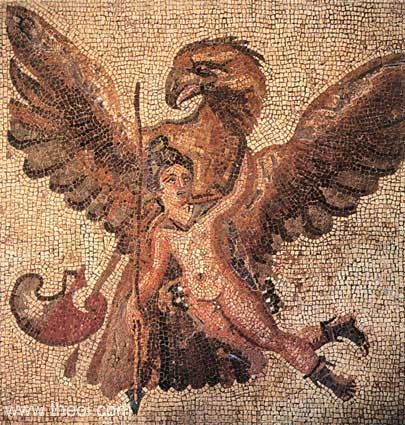
Homer, Iliad 20. 232 ff (trans. Lattimore) (Greek epic C8th B.C.) :
"Tros, who was lord of the Trojans, and to Tros in turn there were born three sons unfaulted, Ilos (Ilus)
and Assarakos (Assaracus) and godlike Ganymedes (Ganymede) who was the loveliest born of the race of mortals,
and therefore the gods caught him away to themselves, to be Zeus' wine-pourer, for the sake of his beauty, so he
might be among the immortals."
Hesiod, Catalogues of Women Fragment 102 (from Oxyrhynchus Papyri 1359 fr. 2) (trans.
Evelyn-White) (Greek epic C8th or C7th B.C.) :
"Dardanos (Dardanus) came to the coast of the mainland [of Troy]--from him Erikhthonios (Erichthonius) and
thereafter Tros were sprung, and Ilos (Ilus), and Assarakos (Assaracus), and godlike Ganymede (Ganymede) . . .
((lacuna)) beauty."
Homeric Hymn 5 to Aphrodite 203 ff (trans. Evelyn-White) (Greek epic C7th - 4th B.C.)
:
"Verily wise Zeus carried off golden-haired Ganymedes (Ganymede) because of his beauty, to be amongst the
Deathless Ones and pour drink for the gods in the house of Zeus--a wonder to see--, honoured by all the
immortals as he draws the red nectar from the golden bowl . . . deathless and unageing, even as the gods."
Pindar, Olympian Ode 1. 40 ff (trans. Conway) (Greek lyric C5th B.C.) :
"He [Poseidon] seized upon you [Pelops], his heart mad with desire, and brought you mounted in his glorious
chariot to the high hall of Zeus whom all men honour, where later came Ganymede, too, for a like love, to
Zeus."
Pindar, Olympian Ode 10. 102 ff (trans. Conway) (Greek lyric C5th B.C.) :
"Lovely his body's grace, that spring-tide hour of beauty, which long since freed Ganymede--so willed
Kypris (Cypris) [Aphrodite]--from death's relentless power."
Ibycus, Fragment 289 (from Scholiast on Apollonius of Rhodes) (trans. Campbell, Vol.
Greek Lyric III) (Greek lyric C6th B.C.) :
"In these lines Apollonios (Apollonius) takes over what Ibykos (Ibycus) said in his account of the rape of
Ganymede [that he was carried off by a love-smitten Zeus] in his song to Gorgias."
Theognis, Fragment 1. 1345 (trans. Gerber, Vol. Greek Elegiac) (Greek elegy C6th
B.C.) :
"There is some pleasure in loving a youth, since once in fact even [Zeus] the son of Kronos (Cronus), king
of the immortals, fell in love with Ganymedes (Ganymede), seized him, carried him off to Olympos (Olympus), and
made him divine, keeping the lovely bloom of boyhood."
Euripides, Iphigenia at Aulis 1051 ff (trans. Vellacott) (Greek tragedy C5th B.C.)
:
"And Dardanos' (Dardanus') child [i.e. his descendant], Ganymede, prince of Phrygia, the dear delight of
Zeus' bed, dipped deep the bowl of gold [at the wedding of Peleus and Thetis attended by the gods], filling the
cups for wine-offerings."
Plato, Laws 636c (trans. Bury) (Greek philosopher C4th B.C.) :
"One certainly should not fail to observe that when male unites with female for procreation the pleasure
experienced is held to be due to nature, but contrary to nature when male mates with male or female with female,
and that those first guilty of such enormities were impelled by their slavery to pleasure. And we all accuse the
Kretans (Cretans) of concocting the story about Ganymedes (Ganymede). Because it was the belief that they
derived their laws from Zeus, they added on this story about Zeus in order that they might be following his
example in enjoying this pleasure as well."
Plato, Phaedrus 255 (trans. Fowler) :
"The fountain of that stream [homosexual desire], which Zeus when he was in love with Ganymede named
Himeros (Desire)."
Pseudo-Apollodorus, Bibliotheca 3. 141 (trans. Aldrich) (Greek mythographer C2nd
A.D.) :
"Tros married Skamandros' (Scamander's) daughter Kallirrhoe (Callirhoe), had a daughter Kleopatra
(Cleopatra), and sons Ilos (Ilus), Assarakos (Assaracus), and Ganymedes (Ganymede). Because of his beauty, Zeus
kidnapped Ganymedes by means of an eagle, and set him as cupbearer in the sky."
Callimachus, Epigrams 53 (from A.P. 12. 230) (trans. Mair) (Greek poet C3rd B.C.)
:
"Yea, by Ganymedes of the fair locks, O Zeus in heaven, thou too hast loved."
Strabo, Geography 13. 1. 11 (trans. Jones) (Greek geographer C1st B.C. to C1st A.D.)
:
"On the boundary between the territory of Kyzikos (Cyzicus) [in the Troad] and that of Priapos (Priapus) is
a place called Harpagia, from which, according to some writers of myths, Ganymede was snatched, though others
say that he was snatched in the neighborhood of the Dardanian Promontory, near Dardanos (Dardanus)."
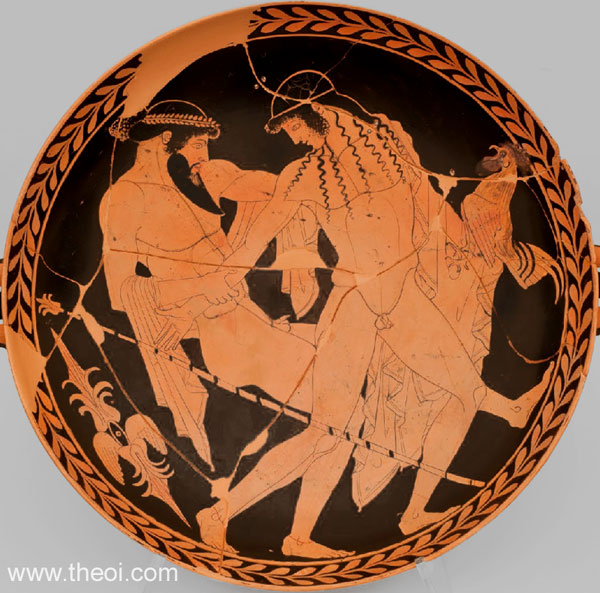
Diodorus Siculus, Library of History 4. 75. 3 (trans. Oldfather) (Greek historian
C1st B.C.) :
"To Tros were born three sons, Ilos (Ilus), Assarakos (Assaracus), and Ganymedes (Ganymede) . . .
Ganymedes, who excelled all men in beauty, was snatched up by the gods to serve as the cupbearer of Zeus."
Pausanias, Description of Greece 5. 24. 5 (trans. Jones) (Greek travelogue C2nd A.D.)
:
"Homer's poem tells how Ganymedes was carried off by the gods to be winebearer to Zeus, and how horses were
given to Tros in exchange for him."
Pseudo-Hyginus, Fabulae 271 (trans. Grant) (Roman mythographer C2nd A.D.)
:
"Youths who were most handsome . . . Ganymede, son of Erichthonius, whom Jove [Zeus] loved."
Pseudo-Hyginus, Astronomica 2. 16 :
"[Constellation] Aquila. This is the eagle which is said to have snatched Ganymede up and given him to his
lover, Jove [Zeus] . . . And so it seems to fly above Aquarius, who, as many imagine is Ganymede."
Pseudo-Hyginus, Astronomica 2. 29 :
"Ganymede, whom Jupiter [Zeus] is said to have made cupbearer of the gods, snatching him up from his
parents because of his beauty."
Ovid, Metamorphoses 10. 152 ff (trans. Melville) (Roman epic C1st B.C. to C1st A.D.)
:
"But now I need a lighter strain, to sing of boys beloved of gods and girls bewitched by lawless fires who
paid the price of lust. The King of Heaven (Rex Superum) once was fired with love of Ganymedes Phrygius
(the Phrygian), and something was devised that Juppiter [Zeus] would rather be than what he was. Yet no bird
would he deign to be but one that had the power to bear his thunderbolts. At once his spurious pinions beat the
breeze and off he swept Iliades [Ganymedes of Ilion]; who now, mixing the nectar, waits in heaven above, though
Juno [Hera] frowns, and hands the cup to Jove."
Ovid, Metamorphoses 11. 756 ff :
"His forebears were Ilus, Assaracus and Ganymede, Jove's [Zeus'] stolen lad, and old Laomedon."
Ovid, Heroides 16. 199 ff (trans. Showerman) (Roman poetry C1st B.C. to C1st A.D.)
:
"[Paris addresses Helene :] ‘Do not disdain a Phrygian for your lord . . . A Phrygian, and born of
our blood, was he [Ganymedes] who now is with the gods, and mingles water with the nectar for their
drinking.’"
Virgil, Aeneid 5. 252 ff (trans. Day-Lewis) (Roman epic C1st B.C.) :
"[Woven into the fabric of a robe was an image of :] Ganymede, hunting on leafy Ida, with his javelin,
hunting down swift stags--you could almost see him panting, the nimble boy; he was pictured, too, being snatched
up aloft from Ida in the claws of Juppiter's [Zeus'] fast-flying eagle--his aged guardians are raising their
impotent hands to heaven, his dogs are furiously barking up at the sky above them."
Valerius Flaccus, Argonautica 2. 414 ff (trans. Mozley) (Roman epic C1st A.D.)
:
"[Among the illustrations of a tapestry of Queen Hypsipyle of Lemnos :] This part showed the rape on leafy
Ida and the famed flight of the boy [Ganymede]."
Statius, Thebaid 1. 459 ff (trans. Mozley) (Roman epic C1st A.D.) :
"[Images embossed on a cup :] Here the Phrygian hunter [Ganymedes] is borne aloft on tawny wings [of an
eagle], Gargara's range sinks downwards as he rises and Troy grows dim beneath him; sadly stand his comrades, in
vain the hounds weary their throats with barking and pursue his shadow or bay at the clouds."
Statius, Silvae 3. 4. 13 (trans. Mozley) (Roman poetry C1st A.D.) :
"Pine-clad Ida . . . boasts the cloud that veiled the heavenly rape [of Ganymedes]! She verily gave to the
gods him on whom Juno [Hera] ever looks in wrath, and withdraws her hand and refuses the nectar."
Apuleius, The Golden Ass 6. 15 ff (trans. Walsh) (Roman novel C2nd A.D.) :
"Highest Jupiter's [Zeus'] royal bird appeared with both wings outstretched: this is the eagle, the bird of
prey who recalled his service of long ago, when following Cupidos' (Love's) [Eros'] guidance he had borne the
Phrygian cupbearer [Ganymedes] to Jupiter [Zeus]."
Nonnus, Dionysiaca 10. 258 ff (trans. Rouse) (Greek epic C5th A.D.) :
"[Dionysos fears for his love, the youth Ampelos :] He feared Kronides (Cronides) [Zeus] might suddenly
appear over Tmolos as a love-bird on amorous wings unapproachable, carrying off the boy with harmless talons
into the air, as once he did the Trojan boy [Ganymedes] to serve his cups."
Nonnus, Dionysiaca 10. 308 ff :
"Swear by your [Zeus'] own young friend [Ganymedes]--when you were an eagle, when you picked up the boy on
the slopes of Teukrian (Teucrian) Ida with greedy gentle claw, and brought him to heaven, had the clown such
beauty as this, when you made him one of the heavenly table still smelling the byre?"
Nonnus, Dionysiaca 15. 279 ff :
"There are herdsmen that lie in heavenly beds . . . He that pours wine for Zeus [Ganymedes] was an oxherd,
whom high-soaring Zeus for his beauty carried off with tender hands."
Nonnus, Dionysiaca 25. 430 ff :
"The Trojan winepourer [Ganymedes] was cunningly depicted [engraved on a shield] with art divine being
carried into the court of Zeus. There well wrought was the Eagle, just as we see in pictures, on the wing,
holding him fast in his predatory talons. Zeus appeared to be anxious as he flew through the air, holding the
terrified boy with claws that tore not, gently moving the wings and sparing his strength, for he feared Ganymede
might slip and fall headlong from the sky, and the deadly surf of the sea might drown him. Even more he feared
the Moirai (Moirae, Fates), and he hoped that the lovely youth might not first give his name to the sea below
and rob Helle of the honour which was reserved for her future. Next the boy was depicted at the feast of the
heavenly table, as one ladling the wine."
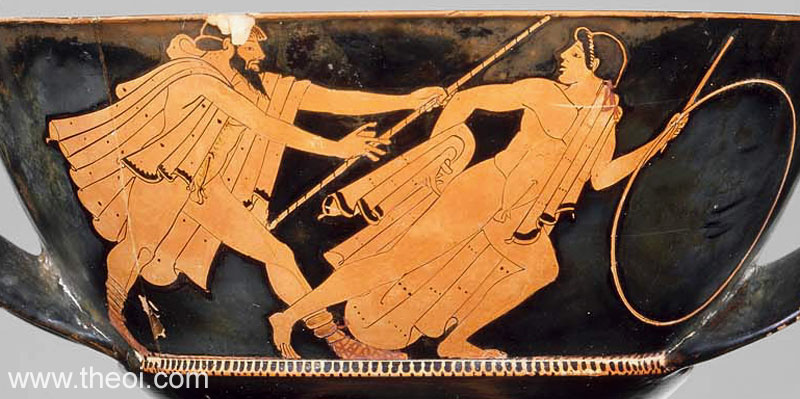
COMPENSATION PAID FOR GANYMEDE
Homer, Iliad 5. 265 ff (trans. Lattimore) (Greek epic C8th B.C.) :
"These [the horses of Aeneias (Aeneas)] are of that strain which Zeus of the wide brows granted once to
Tros, recompense for his son Ganymedes (Ganymede), and therefore are the finest of all horses beneath the sun
and the daybreak."
Homerica, The Little Iliad Fragment 7 (from Scholiast on Euripides Troades 822)
(trans. Evelyn-White) (Greek epic C8th or 7th B.C.) :
"The vine which [Zeus] the son of Kronos gave him [Laomedon] as a recompense for his son. It bloomed richly
with soft leaves of gold and grape cluseters; Hephaistos (Hephaestus) wrought it and gave it to his father Zeus:
and he bestowed it on Laomedon as a price for Ganymedes (Ganymede)."
Homeric Hymn 5 to Aphrodite 203 ff (trans. Evelyn-White) (Greek epic C7th - 4th B.C.)
:
"Verily wise Zeus carried off golden-haired Ganymedes (Ganymede) because of his beauty, to be amongst the
Deathless Ones and pour drink for the gods in the house of Zeus--a wonder to see--, honoured by all the
immortals as he draws the red nectar from the golden bowl. But grief that could not be soothed filled the heart
of Tros; for he knew not whither the heaven-sent whirlwind had caught up his dear son, so that he mourned him
always, unceasingly, until Zeus pitied him and gave him high-stepping horses such as carry the immortals as
recompense for his son. These he gave him as a gift. And at the command of Zeus, the Guide, Argeiphontes
[Hermes], told him all, and how his son would be deathless and unageing, even as the gods. So when Tros heard
these tidings from Zeus, he no longer kept mourning but rejoiced in his heart and rode joyfully with his
storm-footed horses."
Greek Lyric V Anonymous, Fragments 931 (Michigan papyrus) (trans. Campbell) :
"He [Laomedon] would give him [Herakles (Heracles)] the horses which the ruler had got from Zeus as
recompense for his cup-bearer [Ganymede]."
Pseudo-Apollodorus, Bibliotheca 2. 104 (trans. Aldrich) (Greek mythographer C2nd
A.D.) :
"Herakles (Heracles) promised [King Laomedon of Troy] to save her [his daughter Hesione from a sea-monster]
in return for the mares which Zeus had donated as satisfaction for the abduction of Ganymedes."
Pausanias, Description of Greece 5. 24. 5 (trans. Jones) (Greek travelogue C2nd A.D.)
:
"Homer's poem tells . . . how horses were given to Tros in exchange for him [Ganymedes]."
Pseudo-Hyginus, Fabulae 89 (trans. Grant) (Roman mythographer C2nd A.D.) :
"[Laomedon's] horses which walk over water and standing airs of grain."
GANYMEDE CUPBEARER OF THE GODS
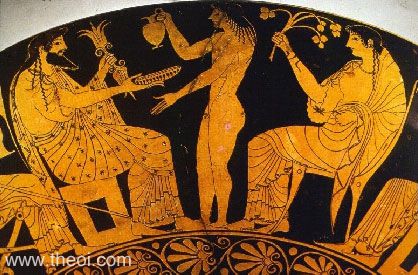
Homer, Iliad 20. 232 ff (trans. Lattimore) (Greek epic C8th B.C.) :
"Ganymedes (Ganymede) who was the loveliest born of the race of mortals, and therefore the gods caught him
away to themselves, to be Zeus' wine-pourer."
Homeric Hymn 5 to Aphrodite 203 ff (trans. Evelyn-White) (Greek epic C7th - 4th B.C.)
:
"Zeus carried off golden-haired Ganymedes because of his beauty, to be amongst the Deathless Ones and pour
drink for the gods in the house of Zeus--a wonder to see--, honoured by all the immortals as he draws the red
nectar from the golden bowl."
Euripides, Iphigenia at Aulis 1051 ff (trans. Vellacott) (Greek tragedy C5th B.C.)
:
"Ganymede . . . dipped deep the bowl of gold [at the wedding of Peleus and Thetis attended by the gods],
filling the cups for wine-offerings."
Diodorus Siculus, Library of History 4. 75. 3 (trans. Oldfather) (Greek historian
C1st B.C.) :
"Ganymedes . . . was snatched up by the gods to serve as the cupbearer of Zeus."
Pausanias, Description of Greece 5. 24. 5 (trans. Jones) (Greek travelogue C2nd A.D.)
:
"Homer's poem tells how Ganymedes was carried off by the gods to be winebearer to Zeus."
Pseudo-Hyginus, Astronomica 2. 29 (trans. Grant) (Roman mythographer C2nd A.D.)
:
"Ganymede, whom Jupiter [Zeus] is said to have made cupbearer of the gods."
Ovid, Metamorphoses 10. 152 ff (trans. Melville) (Roman epic C1st B.C. to C1st A.D.)
:
"[Ganymedes] now, mixing the nectar, waits in heaven above, though Juno [Hera] frowns, and hands the cup to
Jove [Zeus]."
Cicero, De Natura Deorum 1. 40 (trans. Rackham) (Roman rhetorician C1st B.C.)
:
"What viands and beverages, what harmonies of music and flowers of various hue, what delights of touch and
smell will you assign to the gods, so as to keep them steeped in pleasure? The poets array banquets or nectar
and ambrosia, with Juventas [Hebe] or Ganymede in attendance as cup-bearer."
Valerius Flaccus, Argonautica 2. 414 ff (trans. Mozley) (Roman epic C1st A.D.)
:
"[Depicted on a tapestry of Hypsipyle queen of Lemnos :] This part showed the rape on leafy Ida and the
famed flight of the boy [Ganymede]; presently he was standing joyfully at the table in heaven, nay, even Jove's
[Zeus'] armour-bearer himself [Ares] quaffs the beguiling draught from the Phrygian's ministering hand."
Valerius Flaccus, Argonautica 5. 690 ff :
"He [Jupiter-Zeus] renews the banquet . . . and at last sends starry night down from Olympus. Then the
choir of Musae (Muses) and Apollo, striker of the lyre . . . appear, and the Phrygian henchman [Ganymede] bears
round the heavy bowl. They [the gods] rise when slumber calls, and turn themselves each to his own
dwelling."
Statius, Silvae 3. 4. 13 (trans. Mozley) (Roman poetry C1st A.D.) :
"[Ganymede] on whom Juno [Hera] ever looks in wrath, and withdraws her hand and refuses the nectar."
Apuleius, The Golden Ass 6. 24 ff (trans. Walsh) (Roman novel C2nd A.D.) :
"A cup of nectar, the gods' wine, was served to Jupiter [Zeus] by his personal cup-bearer [Ganymede], that
well-known country-lad."
Apuleius, The Golden Ass 11. 8 ff :
"With a Phrygian woven cap and saffron dress, looking like the shepherd-boy Catamitus [Ganymede] carrying a
golden cup."
Colluthus, Rape of Helen 18 ff (trans. Mair) (Greek poetry C5th to C6th A.D.)
:
"The marriage song of Peleus was being sung while, at the bidding of Zeus, Ganymede poured the wine. And
all the race of gods hasted to do honour to the white-armed bride [Thetis], own sister of Amphitrite."
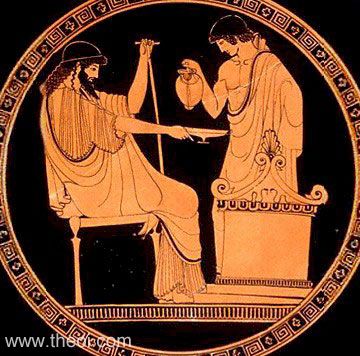
Nonnus, Dionysiaca 8. 93 ff (trans. Rouse) (Greek epic C5th A.D.) :
"I see Ganymedes come here to pour the wine, that long-haired cowdrover, first in Pergamos then domiciled
in Olympos (Olympus), usurping the untouched cup of heavenly Hebe."
Nonnus, Dionysiaca 12. 39 ff :
"Ganymedes draws the delicious nectar, and lifts cup in hand."
Nonnus, Dionysiaca 14. 430 ff :
"Hebe come this way! Take up your pitcher, and bring your Trojan cupbearer who serves with cups the divine
company--let Ganymedes draw honeyed drops from this river and fill all the mixing-bowls of Zeus! . . . that
nectar of Olympos which they say is the drink of Zeus."
Nonnus, Dionysiaca 15. 279 ff :
"He that pours wine for Zeus [Ganymedes] was an oxherd."
Nonnus, Dionysiaca 17. 76 ff :
"[Wine] the image of heavenly nectar brought down to earth, like that which Ganymedes ladles out to rejoice
great Zeus in Olympos."
Nonnus, Dionysiaca 19. 158 ff :
"He [the Seilenos (Silen) Maron in his dance] depicted with wordless art the cupbearer [Ganymedes] of
Kronides (Cronides) [Zeus], or pouring the dew divine to fill up the bowl, and the other immortals in company
ever enjoying cup after cup. His poet's theme was the sweet potion. Aye, he danced also the maiden Hebe herself
drawing the nectar; when he looked at the Satyroi (Satyrs), with voiceless hands he acted Ganymedes, or when he
saw the Bakkhante (Bacchante) women, he showed them goldenshoe Hebe in a picture having sense without
words."
Nonnus, Dionysiaca 25. 430 ff :
"The Trojan winepourer [Ganymedes] was cunningly depicted [in the engravings on a shield] with art divine .
. . the boy was depicted at the feast of the heavenly table, as one ladling the wine. There was a mixing-bowl
beside him full of self-flowing nectarean dew, and he offered a cup to Zeus at the table. There Hera sat,
looking furious even upon the shield, and showing in her mien how jealousy filled her soul; for she was pointing
a finger at the boy, to show goddess Pallas who sat next her how cowboy Ganymedes walked among the stars to pour
out their wine, the sweet nectar of Olympos, and there he was handing the cups which were the lot of virgin
Hebe."
Nonnus, Dionysiaca 27. 241 ff :
"All the inhabitants of Olympos (Olympus) were sitting with Zeus in his godwelcoming hall, gathered in full
company on golden thrones. As they feasted, fairhair Ganymedes drew delicious nectar from the mixing-bowl and
carried it round. For then there was no noise of Akhaian (Achaean) war for the Trojans as once there was, that
Hebe with her lovely hair might again mix the cups, and the Trojan cupbearer might be kept apart from the
immortals, so as not to hear the fate of his country."
Nonnus, Dionysiaca 31. 252 ff :
"[Hera the wife of Zeus complains :] ‘Is it not shame enough, an impious thing, that I see the Trojan
boy [Ganymedes] cup-lackey to Zeus, disgracing heaven and Hebe cupbearer of Zeus, when he ladles sweet nectar
with human hands?’"
Nonnus, Dionysiaca 39. 67 ff :
"Zeus gave Olympian nectar to one of Trojan blood, a country clown, a cowman, Ganymede the cupbearer, and
wine is not equal to nectar . . . Ganymede banquest with the heavenly immortals.'"
Nonnus, Dionysiaca 47. 98 ff :
"The mixing-bowl from the sky [constellation Crater], from which Ganymedes mixes the liquor and ladles out
a cup for Zeus and the immortals."
GANYMEDE & THE TROJAN WAR
Quintus Smyrnaeus, Fall of Troy 8. 427 ff (trans. Way) (Greek epic C4th A.D.)
:
"Now had the Argives [led by Neoptolemos] burst the gates, had breached the walls of Troy, for boundless
was their might; but Ganymedes saw from heaven, and cried, anguished with fear for his own fatherland: ‘O
Father Zeus, if of thy seed I am, if at thine best I left far-famous Troy for immortality with deathless Gods, O
hear me now, whose soul is anguish-thrilled! I cannot bear to see my fathers' town in flames, my kindred in
disastrous strife perishing: bitterer sorrow is there none! Oh, if thine heart is fixed to do this thing, let me
be far hence! Less shall be my grief if I behold it not with these mine eyes. That is the depth of horror and of
shame to see one's country wrecked by hands of foes.’
With groans and tears so pleaded Ganymede.
Then Zeus himself with one vast pall of cloud veiled all the city of Priamos (Priam) world-renowned; and all the
murderous fight was drowned in mist, and like a vanished phantom was the wall in vapours heavy-hung no eye could
pierce; and all around crashed thunders, lightnings flamed from heaven . . . Then left they [the Greeks] that
far-famous town, and turned from war, in awe of Zeus' threatenings."
Quintus Smyrnaeus, Fall of Troy 14. 324 ff :
"The old man [Antenor of Troy] buried her [Polyxeina who was sacrificed to the ghost of Akhilleus
(Achilles)], King Priamos' (Priam's) princess-child, nigh his own house, by Ganymedes' shrine."
Virgil, Aeneid 1. 28 ff (trans. Day-Lewis) (Roman epic C1st B.C.) :
"Her [Hera's] hate for Troy's origin, Ganymede taken and made a favourite [of Zeus]."
GANYMEDE & THE CONSTELLATION AQUARIUS
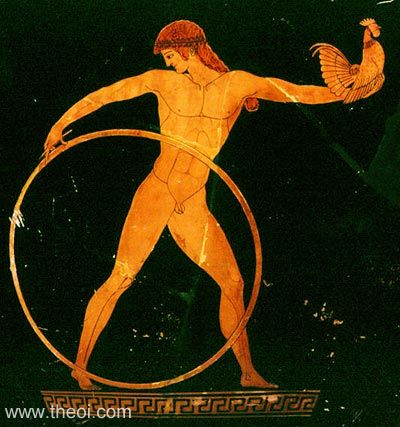
Pseudo-Apollodorus, Bibliotheca 3. 141 (trans. Aldrich) (Greek mythographer C2nd
A.D.) :
"Zeus kidnapped Ganymedes (Ganymede) by means of an eagle, and set him as cupbearer in the sky [i.e. as
Aquarius]."
Pseudo-Hyginus, Fabulae 224 (trans. Grant) (Roman mythographer C2nd A.D.)
:
"Mortals who were made immortal . . . Ganymede, son of Assaracus, into Aquarius of the twelve signs."
Pseudo-Hyginus, Astronomica 2. 16 :
"[Constellation] Aquila (Eagle). This is the eagle which is said to have snatched Ganymede up and given him
to his lover, Jove [Zeus] . . . And so it seems to fly above Aquarius, who, as many imagine, is Ganymede."
Pseudo-Hyginus, Astronomica 2. 29 :
"[Constellation] Aquarius (Water Bearer). Many have said he is Ganymede, whom Jupiter [Zeus] is said to
have made cupbearer of the gods, snatching him up from his parents because of his beauty. So he is shown as if
pouring water from an urn."
Nonnus, Dionysiaca 47. 98 ff (trans. Rouse) (Greek epic C5th A.D.) :
"The mixing-bowl from the sky [constellation Crater], from which Ganymedes mixes the liquor and ladles out
a cup for Zeus and the immortals."
GANYMEDE PLAYMATE OF EROS
Ganymedes was sometimes describes as the "eros" of homosexual love and desire. Plato calls him Himeros (Sexual Desire).
Apollonius Rhodius, Argonautica 3. 112 ff (trans. Rieu) (Greek epic C3rd B.C.)
:
"Kypris (Cypris) [Aphrodite] set out, and after searching up and down Olympos (Olympus) for her boy [Eros
(Love)], found him far away in the fruit-laden orchard of Zeus. With him was Ganymede, whose beauty had so
captivated Zeus that he took him up to heaven to live with the immortals. The two lads, who had much in common,
were playing with golden knuckle-bones. Eros, the greedy boy, was standing there with a whole handful of them
clutched to his breast and a happy flush of mantling his cheeks. Near by sat Ganymede, hunched up, silent and
disconsolate with only two left. He threw these for what they were worth in quick succession and was furious
when Eros laughed. Of course he lost them both immediately--they joined the rest. So he went off in despair with
empty hands and did not notice the goddess's approach.
Aphrodite came up to her boy, took his chin in her hand and said: ‘Why this triumphant smile, you rascal?
I do believe you won the game unfairly be cheating a beginner.’"
Plato, Phaedrus 255 (trans. Fowler) (Greek philosopher C4th B.C.) :
"[Plato on homosexual desire :] And when his feeling continues and he is nearer to him and embraces him, in
gymnastic exercises and at other times of meeting, then the fountain of that stream, which Zeus when he was in
love with Ganymede named Himeros (Desire), overflows upon the lover, and some enters into his soul, and some
when he is filled flows out again."
Philostratus the Younger, Imagines 8 (trans. Fairbanks) (Greek rhetorician C3rd A.D.)
:
"[Ostensibly a description of an ancient Greek painting depicting a scene from Apollonius'
Argonautica :] Boys at Play. The boys who are playing the palace of Zeus are, I suppose, Eros (Love)
and Ganymede, if the one may be known by his tiara and the other identified by his bow and his wings. They are
playing with dice; and Eros is represented as taunting the other insolently and as shaking the fold of his
garment, full as it is of his winnings, while his companion is represented as having lost one of the two dice
left to him and as throwing the other no better hope. His cheek is downcast and the glance of his eye, albeit a
beautiful eye, indicates by its despondency his vexation."
Nonnus, Dionysiaca 33. 74 ff (trans. Rouse) (Greek epic C5th A.D.) :
"She [the Kharis Aglaia (Charis Aglaea)] found him [Eros (Love)] on the golden top of Olympos (Olympus),
shooting the nectar-drops from a cup [playing cottabus and game in which wine was thrown out of cups at a mark].
Beside him stood Hymenaios (Hymenaeus), his fair-haired playfellow in the dainty game. He had put up as a prize
for the victor something clever made by his haughty mother Ourania (Urania) . . . winged Eros had taken and put
up a round golden necklace . . . as a prize of victory. A large silver basin stood for their game, and the
shooting mark before them was a statue of Hebe shown in the middle pouring the wine. The umpire in the game was
Ganymedes (Ganymede), cupbearer of Kronides (Cronides) [Zeus], holding the garland. Lots were cast for the shots
of unmixed wine, with varied movements of the fingers: these they held out, these they pressed upon the root of
the hand closely joined together. A charming match it was between them . . .
[Eros won the contest and] Ganymedes laughing handed the dainty garland to Eros. Quickly he picked up the
beautiful necklace and lifted the globe, and kept the two prizes of their cleverdrop game."
GANYMEDE IN CULT ART
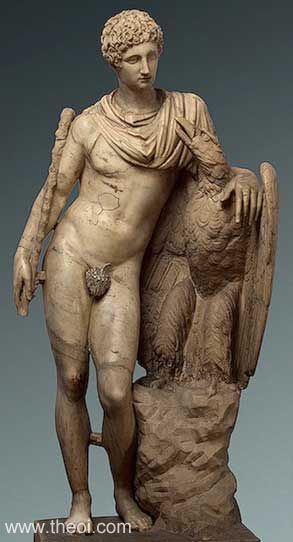
Pausanias, Description of Greece 5. 24. 5 (trans. Jones) (Greek travelogue C2nd A.D.)
:
"[In the shrine of Zeus at Olympia there are :] Other offerings in a row, and likewise images of Zeus and
Ganymede (Ganymede). Homer's poem tells how Ganymedes was carried off by the gods to be winebearer to
Zeus."
Pausanias, Description of Greece 5. 26. 2 - 3 :
"Along the left side of the great temple [at Olympia] Mikythos (MIcythus) dedicated other offerings:
[statues of] Kore (Core) [Persephone], daughter of Demeter, Aphrodite, Ganymedes and Artemis, the poets Homer
and Hesiod, then again deities, Asklepios (Asclepius) and Hygeia."
GANYMEDE MISCELLANY
A couple of late classical rationalisations of the myth of Ganymedes are found in the Byzantine Suda.
Suidas s.v. Ilion (trans. Suda On Line) (Byzantine Greek lexicon C10th A.D.)
:
"In the territory of the Phrygians Tros, the father of Ilos (Ilus) and Gannymedes (Ganymede), was king
after founding Troy in his own name and Ilium in his son's name. After filling all the cities he won over the
local rulers from Tantalos (Tantalus), the King of Thrake (Thrace). And after some time he sent his son
Gannymedes, strongly loved by him, with 50 men, to take sacrifices and gifts to European Zeus for thanksgiving.
So Tantalos (Tantalus), thinking that he was sent to spy on his kingdom, overpowered him before he reached the
temple. And after learning the real reason he nursed him. But he (Ganymedes) after a short while was overcome by
disease and died. Tantalos in grief placed him in a coffin, and sent men to tell his father of his death. The
poets wrote that Gannymedes was kidnapped by Zeus, turning the bitterness of his death into myth."
Suidas s.v. Minos :
"[King Minos of Krete (Crete)] hearing of the great fame, in Phrygia, of Tros the king of Troy and of his
sons, he went to the city of Dardanos (Dardanus) where Tros lived. Tros had three sons: Ilos (Ilus), Assarakos
(Assaracus), and Ganymede, [the last] of whom had a great name for beauty. So Minos stayed as a guest with Tros,
both giving and receiving presents, and he ordered Tros to summon his sons, so that he might see them and give
them presents too. But Tros said that they had gone on a hunt. [So] Minos too wanted to hunt with them. At first
[Tros] sent one of his attendants into the place where the boys were hunting, around the Granikos (Grenicus)
river; but Minos, having sent out his ships a little beforehand to the river, came later to the sons and saw
Ganymedes and fell in love with him. And having given out orders to the Kretans (Cretans) and snatched the boy,
he him in the ship and sailed away. The place was called Harpagia. Minos took the boy and went to Krete (Crete).
The boy to ease his pain killed himself with a sword, and Minos buried him in the temple. Hence, of course, it
is said that Ganymede serves with Zeus."
ANCIENT GREEK & ROMAN ART
SOURCES
GREEK
- Homer, The Iliad - Greek Epic C8th B.C.
- Hesiod, Catalogues of Women Fragments - Greek Epic C8th - 7th B.C.
- Epic Cycle, The Little Iliad Fragments - Greek Epic C8th - 7th B.C.
- Pindar, Odes - Greek Lyric C5th B.C.
- Greek Lyric III Ibycus, Fragments - Greek Lyric C6th B.C.
- Greek Elegaic Theognis, Fragments - Greek Elegaic C6th B.C.
- Euripides, Iphigeneia at Aulis - Greek Tragedy C5th B.C.
- Plato, Laws - Greek Philosophy C4th B.C.
- Plato, Phaedrus - Greek Philosophy C4th B.C.
- Apollodorus, The Library - Greek Mythography C2nd A.D.
- Apollonius Rhodius, The Argonautica - Greek Epic C3rd B.C.
- Callimachus, Fragments - Greek Poetry C3rd B.C.
- Diodorus Siculus, The Library of History - Greek History C1st B.C.
- Strabo, Geography - Greek Geography C1st B.C. - C1st A.D.
- Pausanias, Description of Greece - Greek Travelogue C2nd A.D.
- Philostratus the Younger, Imagines - Greek Rhetoric C3rd A.D.
- Quintus Smyrnaeus, Fall of Troy - Greek Epic C4th A.D.
- Nonnus, Dionysiaca - Greek Epic C5th A.D.
- Colluthus, The Rape of Helen - Greek Epic C5th - 6th A.D.
ROMAN
- Hyginus, Fabulae - Latin Mythography C2nd A.D.
- Hyginus, Astronomica - Latin Mythography C2nd A.D.
- Ovid, Metamorphoses - Latin Epic C1st B.C. - C1st A.D.
- Ovid, Heroides - Latin Poetry C1st B.C. - C1st A.D.
- Virgil, Aeneid - Latin Epic C1st B.C.
- Cicero, De Natura Deorum - Latin Rhetoric C1st B.C.
- Valerius Flaccus, The Argonautica - Latin Epic C1st A.D.
- Statius, Thebaid - Latin Epic C1st A.D.
- Statius, Silvae - Latin Poetry C1st A.D.
- Apuleius, The Golden Ass - Latin Novel C2nd A.D.
BYZANTINE
- Suidas, The Suda - Byzantine Greek Lexicon C10th A.D.
BIBLIOGRAPHY
A complete bibliography of the translations quoted on this page.
